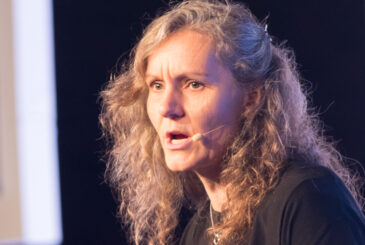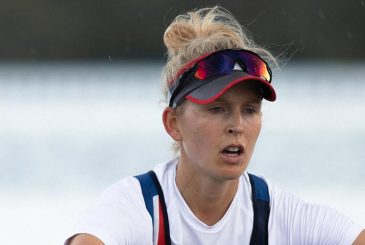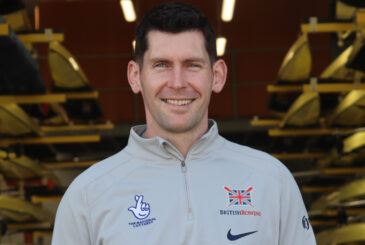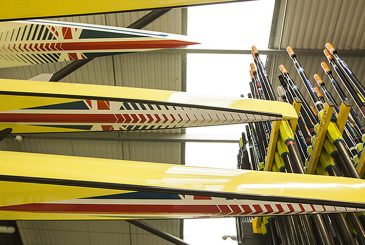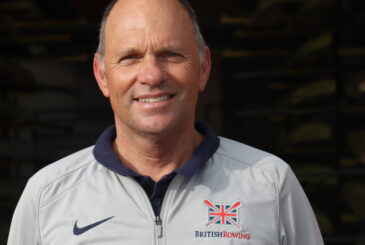The final of the women’s doubles at the 2008 Beijing Olympics was one of the most exciting races ever. In a rare interview with New Zealand’s Evers-Swindell twins and Britain’s Elise Sherwell and Anna Watkins, Martin Cross rewinds the clock back to the 2008 season
In one of the most gripping of all Olympic finals, the women’s doubles at the Beijing Olympics saw the Germans – AnneKatrin Thiele and Christiane Huth – fly out and lead their Olympic final until the very last stroke.
It was the Evers-Swindell twins from New Zealand who tracked them all the way, finally forcing their bows in front, when it looked as though both time and water had run out. The margin at the finish was 0.01 seconds. It was a result that saw the All Blacks become Olympic champions for the second successive time. But, incredibly, there was a third double who came within a whisker of beating both of those crews. In the last 500m, the British boat of Elise Sherwell (née Laverick) and Anna Watkins were closing on the two leaders like an express train. At the finish, they were only 0.23 seconds off gold.
Read on to hear more about this extraordinary showdown as Martin Cross catches up with the two Kiwis, Georgina and Caroline, and Elise and Anna as they relive the memories of that amazing final and the eventful season that preceded it.
Caroline: I was sick that year and I don’t think we raced in Lucerne. The whole pre-tour was awful. We went to race in Poland [World Cup III], where a lot went wrong – and we failed to make the A final.
Georgina: On the way home, we said we don’t want to go to Beijing if that’s as good as we are. Our coach Richard Tonks just said: ‘I think you’re better than that. And I want you to go’. He had the confidence in us and so I think that’s what turned it around. It wasn’t a physical thing; it was a mental game at that stage. He’d always talked about the top two inches, and that’s what it comes down to in a rowing race, so it doesn’t matter how strong you are. It’s up here.
Caroline: We also had a sports psychologist guy. He was in Poland. He met us after we failed to make the A final, and we were in a bit of a mess. I think we pretty much cried every day. We did not want to go out and race the B final. But the sports psych Rob stayed with us, right through until our final in Beijing. We saw him nearly every day.
“Mom and Dad actually went to watch, and I think they went there to mop up tears, not to celebrate anything”
Georgina: We had six weeks at home, and we were training with Mahé [Drysdale] and the women’s pair, so we knew our speed was starting to pick up ahead of Beijing.
Elise: We were the opposite really in many ways. We did win in Poland, but I don’t think that the coaches believed that we might be really competitive. I think the worst thing for me was that we went on training camp to Breisach, just three weeks before we left for Beijing, and one of the girls in the quad was injured. And so Thommo [Paul Thompson] took Anna to row in the quad, and we had barely rowed together all year.

Anna: It was my first Olympics, so I was like, I’m gonna do this by training harder. We went to Cyprus, in September for a kick-off camp. And it was three sessions, sometimes four, which was more than I’d done, and I just hit it really hard and got a massive sore throat at the end and then just struggled hugely. Eventually it turned out to be glandular fever. Then I had this post-viral fatigue thing.
We never rowed together all winter. In the final camp in Breisach, it was really obvious that we were the second boat, and we were there to support the quad. In retrospect, that affected me more than I probably realised at the time, just because, I never saw us as being as fast as we probably were.
Georgina: We had no expectations going to Beijing. Mom and Dad actually went to watch, and I think they went there to mop up tears, not to celebrate anything. We went there, wanting to prove that we were better than Poland. It was purely about us.
Anna: How did the Beijing cycle compare to the Athens cycle for you guys?
“Dick’s race talk was just: ‘Have fun, enjoy yourselves’”
Caroline: Do you know when we crossed the finish line in Athens there was just a huge sense of relief that we’d done everything that everybody expected of us. There was just this huge amount of pressure from everybody. I hated the favorites title. And, so, I don’t think we enjoyed our win, it was just like, ‘Thank goodness, that’s over’. We didn’t really celebrate.
Anna: As far as our aim for the Olympics, we’d got a bronze medal, the year before. So, we knew we shouldn’t drop below that standard. The Chinese had won the year before. They came to the Beijing year as a crew to beat. Hand-on-heart, I didn’t think that we could beat them.
Georgina: Our heat was probably one of my most enjoyable races. We were up against Germany. Anyway, they gave up pretty quickly and I think for us, it’s what helped a lot. Nothing’s ever easy, but for an Olympic heats race with one final place open, it was straightforward.
Elise: So, in our heat, we came third to China and went into the rep, where we beat Germany. So, we went into the final thinking it would be China, New Zealand and then, you know, us – probably pushing up behind. Our team talk before the final wasn’t the best.
I mean you guys all have won. And I never have, and so I often look back at that race and think well that was my opportunity, perhaps you know if things had gone right… Anna is obviously Anna: phenomenal strength and power and everything else. And I often thought, how could I have talked you round, particularly, that second 500 was always our weakness. How could I have got that extra little bit, so we didn’t slip back quite so much in the second 500m? Because, you know, we had that great finish.
Anna: Elise, that second 500 – I didn’t learn that till later. I was doing like a crazy amount in the first 500, like a stupid amount, and that was what was costing me in the second 500 and I had to back off at 250. That’s what I had to learn – I didn’t know that then.
Caroline: Dick’s race talk was just: ‘Have fun, enjoy yourselves’. He didn’t really need to say anything more. He knew that we weren’t the team that needed to be hyped up on the day.
Elise: I was just gonna ask how was it rowing together as twins?
Caroline: Rowing with Georgie in the double because we were sisters, it felt more like we were representing our family than we did our country.
Georgina: But the thing is, it’s a double-edged sword. I mean, when it goes well, she is the best person in the world to be doing something with, but the negative side is that you usually don’t hold back. It was like a marriage.
Caroline: Every time we saw the sports psychologist it was always our goal to just concentrate on the process rather than the outcome. Talk’s so easy, but actually putting it into practice is hard, and I don’t think I ever really mastered that until that final race.
We always like to lead from the start. I was very proud of the way we raced it in that first part of the race because we didn’t lead. I just remember staying focused on our boat. I was pretty stoked that I got it in our last race. So, did that equate with you, Georgie?
“A gold medal would have made a big impact for both of us”
Georgina: We had a slow start. But I think we’ve been sort of working on that a little bit, and I remember not panicking, which I might have done in previous years, and we settled into a rhythm. And I think our second five or the middle thousand was just a really good pace for us and we moved through the field. We never wanted to cross the finish line and have any ‘what ifs’.
Looking out of the boat was always a big no-no, but I remember looking out a couple of times. So, we knew, probably in the last three or four hundred meters that we were in a medal position, and after Poland, that seemed beyond amazing.
Caroline: I was at stroke and Georgie would yell at me if I ever looked out of the boat, so I wasn’t aware of the Germans, but I was more aware of the British girls and I probably thought, let’s try and hold on to the silver. After Poland, I can’t believe we’ve rowed ourselves into this position, let’s just try and hold on.
Elise: My husband said to me before the race – and he still says this to me now – you should have called the last 500, 250 early, then you would have had a chance.
Anna: I don’t remember much in the first half, but I remember coming through the middle – probably coming through the Chinese – and thinking this is going, well because we’re in a medal position. And, also, because we’d rowed the Germans down in the rep, I wasn’t so fussed about them being way out in front because I thought they were going to blow.
Elise: And the margins between us and you, [Georgina and Caroline] were so tight. If you look at the World Championships in 2007, and that Beijing final you beat us by a total of .25 or something from both races… I think the only time that I honestly believed that we could win was in that last 250, and I just remember screaming at Anna: ‘We can win this!’, so if I had called that 250 early…
Anna: I remember finding the gear that wasn’t anything like what we’d practised. It was a sort of emotional thing, and I remember, stepping up as though it was some kind of max power test. And, so the question always in my head was, what if I had put in that 10 strokes before, because there was something else… and I had never done it before?
Caroline: We just were just amazed that we were in medal contention, and it wasn’t about gold; it was about proving to ourselves that we were competitive and better than in Poland. I was trying to hang on to second and I remember Georgie did do a call on the Germans, but they were still out of my eyesight. Richard [coach] explained it as the slowest overtaking that he’d ever seen.
“We probably deserved a bit more credit for having put out such a great race, especially having the year that we had”
Georgina: Yeah, yeah, I mean it was hard for us, it must have been awful watching it. It was just an Olympic final and for the last 30 strokes we had calls that we did for every race. So, it was just put the head down and, and push it to the line. I don’t know what I was thinking, to be honest. When we crossed the line, I was just really happy.
The Germans looked over the moon – I thought they’d won. It seemed like a really long wait – we had no idea. We heard a big cheer from the crowd again that could have been for anyone. And it wasn’t until the umpire boat came over and said congratulations New Zealand – it was just I didn’t believe him. It was disbelief.
Caroline: After Athens I just wanted to enjoy it. So much work goes into that and in 2004, we didn’t give it the enjoyment that it deserved inside. Yes, I just was really keen to just soak up the atmosphere of Beijing.
Elise: When we crossed the line, we knew that we had come third. And we knew that we’d had a good last 250m. I think we’d be lying if I said that we weren’t hugely disappointed with ourselves. But Anna and I had a pep talk once we got off the water. To everybody else, we needed to show that we were happy that we’d medalled.
Anna: It’s different for me because it was my first Olympics and, you know, Elise, already had a bronze medal [from Athens]. And, you know, I remember the terror of the days before. A lot of times during that year a bronze would have seemed a good result. But for the race, itself, it wasn’t a good result because it was so tight. A gold medal would have made a big impact for both of us. I think, more so for Elise. But for myself going on into London I was like completely anonymous next to Katherine, whereas if I’d have already been an Olympic champion…
Georgina: I haven’t really thought about being a double Olympic champion to be honest.
Caroline: Athens and Beijing were two totally different races, weren’t they Georgie? So, no, I haven’t really given it any thought either. Beijing was just such a different experience to Athens and such a different experience to Poland. But for me it was just more about being happy with what I had done for myself. We didn’t announce our retirement until about a month later, but I think we both kind of knew that that was our last race, so you start to appreciate and enjoy everything a bit more.
Elise: I think we – well I – felt pretty flat. I felt, we probably deserved a bit more credit for having put out such a great race, especially having the year that we had… to have come so close…
Caroline: Sometimes you have to stop and remind yourself that you did row, and you did go the Olympics, and, yeah, it’s only really times like this that I get to talk about it and tell my kids.
Illustration: Syahrulhart / Fiverr



